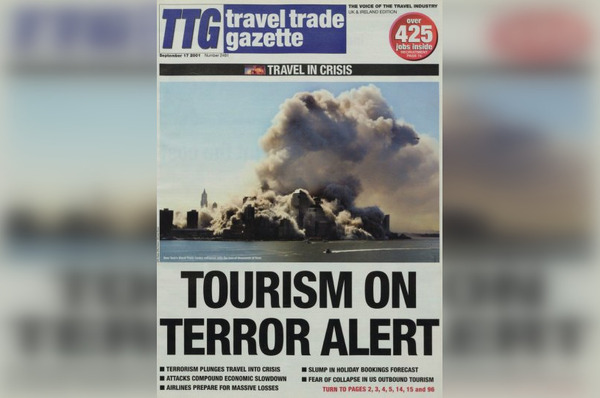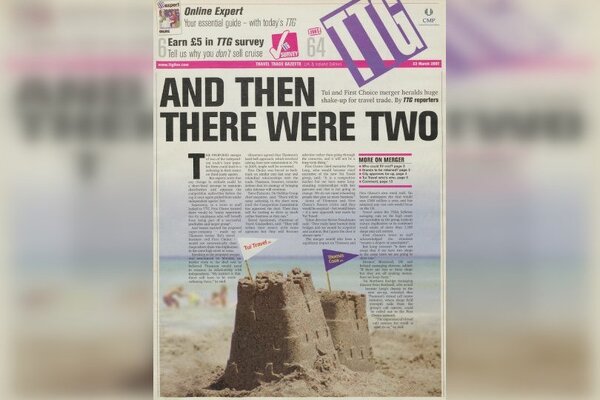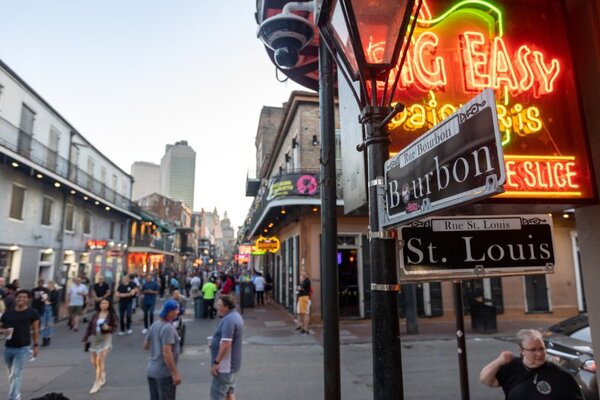TTG at 70: How terror in the 2000s changed travel for ever
 James Chapple
James ChappleJust a year after the new millennium, the 9/11 terror attacks in the US prompted TTG to predict travel would change for ever, with new security measures at airports and onboard flights enduring to this day.
Airlines were forecast to lose $10 billion and hotels braced for the biggest slump in 30 years. In the immediate aftermath, some 70,000 airline jobs were lost. An estimated 15% of global cruise bookings, worth $4 billion, also evaporated, while all the big US airlines sought bankruptcy protection and Air France and KLM merged.
The fallout from the crisis was prolonged by the US-led invasion of Iraq, which saw troops stationed at Heathrow. An estimated 50% of family bookings were lost in 2003, while bookings to Cyprus fell by a staggering 60%. One agent said simply: “The Med is dead.” Baghdad soon fell, and Easter 2003 saw travel’s recovery begin in earnest, only for Asia to be plunged into crisis with the emergence of the Sars virus.
Climate change
The Indian Ocean was beset by tragedy following the devastating Boxing Day tsunami in 2004, which prompted industry-wide relief efforts. Hurricane Wilma, meanwhile, led to 8,500 UK tourists being airlifted from Cancun amid warnings such occurrences could become regular, strengthening the green lobby.
However, in 2007, then-prime minister Tony Blair warned it was “impractical to stop people flying”. The early part of the decade also saw domestic tourism devastated by foot-and-mouth disease in cattle, closing large swathes of the UK.
Meanwhile, the 2000s bore witness to efforts by British Airways to reshape the airline-agent relationship, scrapping commission for transaction fees. BA later axed these payments altogether, a move mirrored by almost all carriers selling in the UK. Operators also began driving down agent commissions, with Tui introducing a 7% base rate in 2005.
Operators’ marketing also came under scrutiny, with 25-35% peaks discounts. TTG pointed out these were priced in to allow in-house agencies to offer “bargains”. Independent agents launched a campaign exposing bogus “discounts” of 50%, while Thomson went against the flow by not discounting any 2001 and 2002 brochure prices.
Elsewhere, Virgin Group launched Virgin Sun – a short-haul tour operation and airline it pledged would be a market leader – only to wind up trying to offload it after just 18 months, before finally closing it altogether. The decade, though, did see charter operators explore new destinations, with Airtours and Unijet launching flights from Gatwick to Brazil’s beaches.
Online expansion
Online commerce began to blossom, but several travel start-ups failed, prompting TTG to warn the collapses “posed serious questions about the viability of selling package holidays online”. However, by 2006, no-frills airlines were predicted to sell more packages than the big four operators.
Airtours, which spent millions buying agency chains, was forced to admit it had too many shops – sometimes up to three in the same town – and confirmed plans to close 120 Going Places and Travelworld branches. Many displaced staff became pioneers of the homeworking revolution.
The business transformed into MyTravel, but was left with a million unsold holidays in summer 2002 amid ongoing fears over travelling. Airtours was then said to have priced 2003 at low margins, incurring a £73 million annual loss, which led to it seeking refinancing with the need to sell off brands.
Accounting errors and write-downs resulted in the business losing almost £1 billion the following year. It was later to merge with Thomas Cook, which largely subsumed it, removing 200 shops shortly after. Eventually, 1,200 MyTravel head office staff were made redundant.
The Cook/MyTravel deal prompted Tui to buy up First Choice, creating a “big two” in the UK, albeit while leaving space for a third big operator, a gap which was later filled by the XL Group. However, XL was to collapse in 2008, leaving 85,000 people stranded abroad.
Cruise goes mainstream
In the airline world, 2000 saw BA introduce premium economy and its short-lived, no-frills subsidiary Go begin flying domestic routes. The decade also saw the end of Concorde and the launch of budget airline ventures such as MyTravel Lite, Thomsonfly.com and Bmibaby in the UK.
Another, EUjet, based at Kent’s Manston airport, collapsed in peak season 2005, prompting TTG to launch a campaign for a £1 levy to protect scheduled airline sales.
We also witnessed the inauguration and collapse of all-business class transatlantic carriers Eos, Maxjet and Silverjet, the first flight of the Airbus A380, and the opening of Heathrow Terminal 5.
Cruising also became less formal in the 2000s with P&O Princess Cruises launching Ocean Village, aimed at the “dress down Friday” generation. The decade was also to see soaring popularity of ex-UK cruising and the introduction of larger vessels.
Meanwhile, in 2007, TTG understatedly described the “latest gadget” from Apple as “a mobile phone crossed with an iPod”. The iPhone, it predicted, “could hasten the revolution in travel being booked via mobile phones”.
What did it all mean?
The effect of 9/11 and the US-UK attack on Iraq was immense, but short-lived compared with the Covid pandemic. Consolidations and collapses following 9/11 and the Gulf War meant the travel industry edged closer to what we recognise today, particularly in making the US airline industry more stable.
It was also the decade when online brands really began growing, while traditional travel companies realised distribution models had to change – both in terms of online presence and how they rewarded retail partners.
TTG at 70: Opening up the archives
During our 70th anniversary year (2023), TTG charted the history of the travel industry through a series of special features delving into the magazine's 70-year back catalogue, all of which is archived on the TTG Media website. Here is the story so far:
- How travel took on the Covid crisis – and won
- The long journey to package holiday perfection
- How travel agents have stood the test of time
- The extraordinary rise of the cruise industry
- Aviation's highs and lows through the ages
- The ash cloud, the rise of cruise – and the death of an institution
- How – and why – terror changed travel forever
- The 90s – the decade that just about saw it all
- How travel's boom-bust nature came to be
- The 'big bang' that made travel affordable for all
- All hail the package in the Swinging Sixties
- The rise of mass travel, and where it all began
Sign up for weekday travel news and analysis straight to your inbox

James Chapple
Supplier Directory
Find contacts for 260+ travel suppliers. Type name, company or destination.












